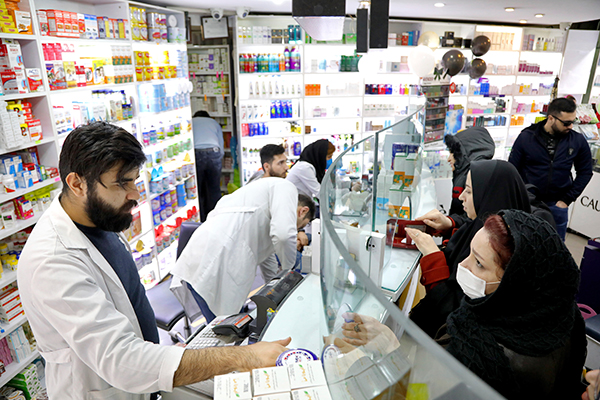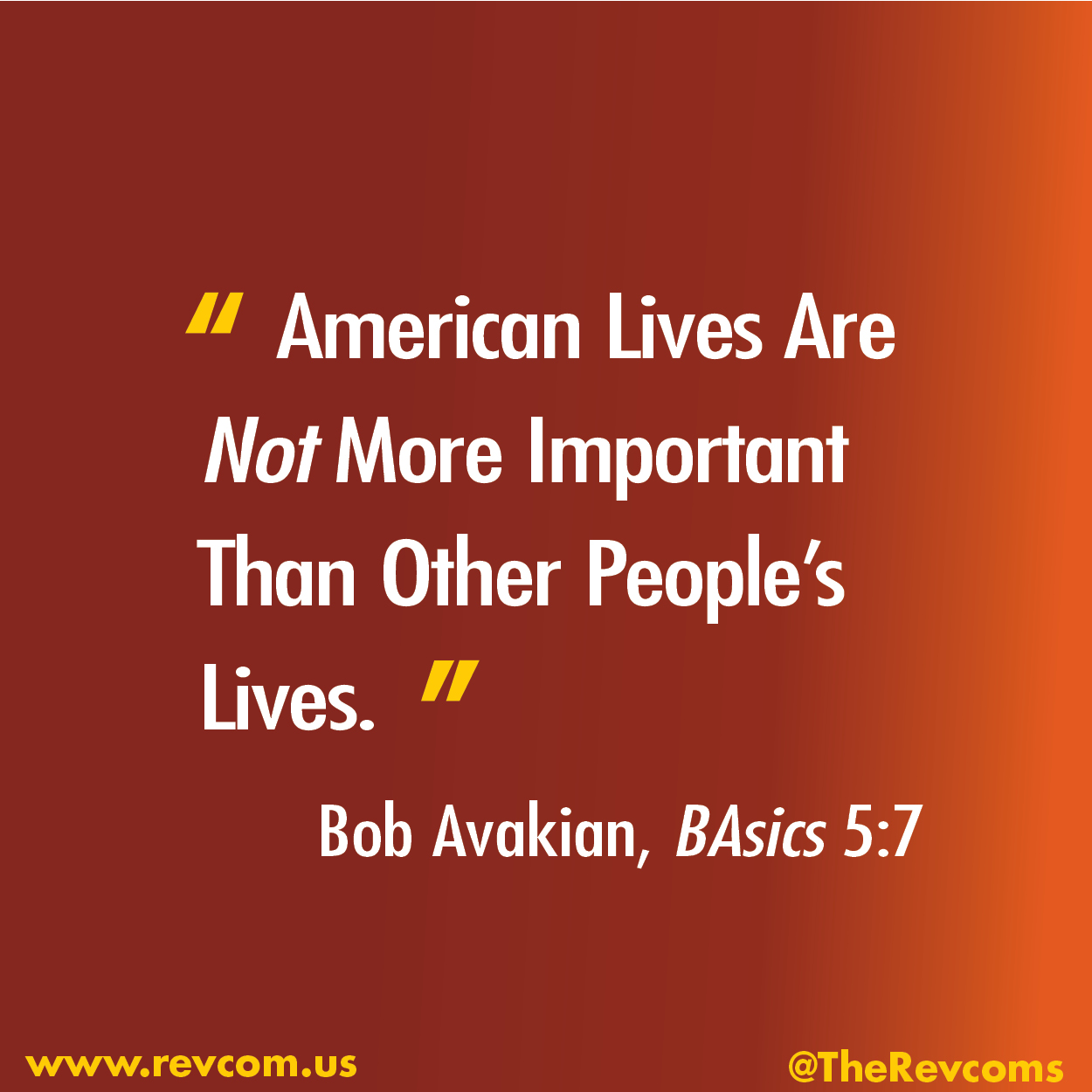Medical Terrorism—American Style:
U.S. Sanctions and Military Threats Escalate Iran’s COVID-19 Death Toll and Threaten the World
| revcom.us
Editors’ note, November 22, 2020: This article was originally posted when the coronavirus pandemic first hit Iran in the spring. Today, as Iran—like many other countries—faces a deadly new wave of COVID infections and deaths, the Trump/Pence regime is intensifying the economic sanctions against this country, which are a big part of making the disease even more deadly there.
How would you feel if you saw images of heavily armed U.S. troops protecting U.S. Treasury Department officials who stood outside hospitals, medical clinics, and pharmacies preventing people, including the desperately ill, from buying life-saving supplies, medicines and equipment during today’s global COVID-19 pandemic?
Well that’s essentially what the U.S. is doing to Iran right now with devastating economic and financial sanctions and ominous military threats. Iran, an oppressed or “Third World” country of some 85 million, is one of the global epicenters of the COVID-19 pandemic. As of April 2, 3,160 people had died, over 50,000 are infected, and there is still a high rate of infections. Some officials say Iranians are dying as often as one every 10 minutes. A worst-case study by an Iranian university projected 3.5 million could die.1 These sanctions have made it worse.
America’s Killer Sanctions
In 2017, the U.S.—not Iran—broke the agreement that the two countries and other world powers had signed in 2015 limiting Iran’s nuclear program in return for lifting economic sanctions. The U.S. then re-imposed even more draconian trade and financial restrictions, which have crippled Iran’s economy by blocking it from importing and exporting goods, and punishing other countries who wished to invest in or trade with Iran. It’s estimated that Iran has lost over $200 billion, mostly in oil revenues. Unemployment and inflation have skyrocketed, and Iran has been blocked from making or importing needed medicines and medical equipment. This includes “specialized drugs for children living with and recovering from cancer,” according to one aid worker in Tehran, Iran’s capital.2 Iranians have been suffering and dying since 2017 as a result.
And now the coronavirus pandemic has hit. Has the U.S. eased or lifted sanctions in light of the humanitarian crisis caused by the COVID-19 pandemic? No! “If anything, the United States has doubled down, imposing fresh sanctions as recently as two weeks ago,” the New York Times reports. Many in the Trump/Pence regime see the coronavirus crisis, which is seriously weakening Iran, as an opportunity to bully Iran into submission. In other words, the U.S. imperialists see death by pandemic as a potential opportunity to impose their domination!3
Secretary of State Mike Pompeo claims that U.S. sanctions don’t prevent Iran from getting humanitarian aid including medicines, claiming “humanitarian assistance to Iran is wide open, it's not sanctioned.”
This is a lie. Companies around the world remain fearful of violating U.S. banking and financial regulations.4 In 2019 the Atlantic Council reported that, “despite the fact that sanctions exempted humanitarian goods, the US Treasury Department had previously prosecuted medical companies for selling small amounts of medical supplies to Iran, which in turn, has had a deterring effect on other companies doing business with Tehran.” Trump allies have also targeted U.S. and European companies to scare them out of selling medical supplies to Iran. According to The American Prospect, “the stealthy name-and-shame operations of such groups has been a major driver of the reluctance on the part of many Western companies to do humanitarian trade with Iran. And this trade is the primary source of medical supplies flowing into the country...”
“The American sanctions have 100 percent and absolutely played a role” in Iran’s shortages of protective equipment, one Iranian physician wrote: “At the moment, we are dealing with a shortage of basic supplies, like masks, because there is an embargo on paper materials that we need to make more. As a result, nurses and physicians are forgoing wearing masks to give theirs to patients.”5
This is also why Iran is struggling to import raw materials needed to manufacture antiviral drugs, and why suppliers in Iran now say they are out of respiratory masks, surgical gowns, and ventilators. Dozens of Iranian doctors, nurses and medical personnel have reportedly taken ill and died because they lacked personnel protective equipment.6
And medicines and equipment aren’t the only nightmares: “One young man in Tehran told me that everyday health problems have been severely exacerbated due to the vast shortages resulting from sanctions. This isn’t just about medicine or over-the-counter supplies, but staples such as vegetables and beef that are essential for basic nutrition.”7
The lack of medical supplies and the spread of the virus have hammered Iran’s already weakened economy with factories shutting down and unemployment spiking, and the government left without the revenue to bail out businesses or establish quarantines and support those who can’t work.
Waves of Afghan migrants, now estimated at three million, have fled Afghanistan for Iran to escape the U.S.-Soviet proxy war of the 1980s, the civil war of the 1990s, and the U.S. invasion and occupation that began in 2001 and hasn’t yet ended. Now they’re fleeing back to Afghanistan—some 115,000 in mid-March alone—because they’ve lost their jobs or to flee from the coronavirus pandemic. Some are no doubt bringing the disease with them.8
Russia, China, the European Union, the United Nations secretary general, and human rights groups, as well as some Democratic Party political figures, including Sanders and Biden, have demanded the U.S. suspend or lift sanctions on Iran during the pandemic, and some including the EU and Japan are sending aid to Iran.9
Officials warn that U.S. actions not only threaten Iran’s 85 million people, but also the whole world by spreading and escalating the global contagion.
Iran’s Islamic Republic Has Also Contributed to the Severity of the COVID-19 Epidemic
The rulers of Iran’s reactionary Islamic Republic also bear responsibility for how ferociously the contagion is ripping through the country. The World Health Organization declared a health emergency in late January, yet the Islamic Republic refused to warn the public for fear of interfering with February’s elections and celebration of the 41st anniversary of the Iranian revolution, and also refused to heed the advice of their own medical experts and quarantine affected areas or enforce social distancing until recently. The anti-scientific, fundamentalist religious fervor which is a core ideological pillar of its rule has also contributed to spreading the pandemic as the government initially refused to restrict visitors at religious shrines, and some religious fanatics—like some Christian fundamentalist fascists in the U.S.—have refused to halt mass prayer services.
Some Iranians report there’s widespread criticism of the authorities for claiming religious shrines could protect pilgrims from the disease. There’s been no food distribution for those who’ve lost jobs. Some large factories are forcing employees to go to work, endangering them in the process.11 And there have been reports of attempted rebellions by political prisoners and strikes by their families demanding they be released from Iran’s dungeons.
The Looming Threat of Escalating U.S. Military Aggression
As if devastating U.S. sanctions weren’t bad enough, the U.S. is also drawing up plans for possible military attacks against militias in Iraq, which have ties—or are accused of having ties—with Iran.
Since last spring, the Trump/Pence regime has built up the U.S. military presence in the Persian Gulf and stepped up its threats against Iran. This took a leap in January with its illegal assassination of Iranian General Soleimani. Since then there have been a number of rocket attacks by Iraqi militias on U.S. bases, and retaliatory strikes by the U.S. This included one on March 12 in which U.S. warplanes struck against five different targets linked with the militias it claims are responsible for an attack that killed two Americans and a British soldier.12
Now, the New York Times is reporting that the Pentagon is secretly drawing up plans for a possible campaign to destroy an Iranian-linked militia group the U.S. claims is threatening more attacks against U.S. troops (5,000 are stationed in Iraq). This would mark a major U.S. military escalation, and the top U.S. commander in Iraq has said it could lead to bloody clashes in Iraq, undermine the U.S. position there, and risk war with Iran. Others in the Trump/Pence regime see an opportunity to try to destroy Iranian-backed militia groups at a time Iran’s government is struggling to control the coronavirus pandemic.13
Ominously, on April 1, Trump claimed he had “very good information” that Iranian-supported militias were planning new attacks on U.S. forces, and warned on Twitter “If this happens, Iran will pay a very heavy price, indeed!”14 After helping make the COVID-19 pandemic even more devastating, such military aggression would be adding a nightmare onto the nightmare the U.S. imperialists have already created for the peoples of Iran, Iraq, and the Middle East—and must be vigorously opposed.
1. “Sanctions are crippling Iran’s fight against coronavirus,” Guardian, April 4; “Trump’s refusal to relax Iran sanctions during the coronavirus threatens everyone,” NBC News, March 26, 2020. [back]
2. “Iran Says U.S. Sanctions Are Taking Lives. U.S. Officials Disagree,” New York Times,” April 1; How U.S. Sanctions Intensify the Spread of the Coronavirus in Iran ,” American Prospect, March 17, 2020. [back]
3. “Iran Says U.S. Sanctions Are Taking Lives. U.S. Officials Disagree,” New York Times,” April 1, 2020 [back]
4. “Trump’s refusal to relax Iran sanctions during the coronavirus threatens everyone,” NBC News, March 26, 2020. [back]
5. “The Coronavirus Is Killing Iranians. So Are Trump’s Brutal Sanctions,” Intercept, March 17, 2020. [back]
6. Dozens of Doctors Die in Iran Hospital From Coronavirus, Iran Focus, March 25, 2020. [back]
7. American Prospect, March 17, 2020. [back]
8. “Fresh From Iran’s Coronavirus Zone, Now Moving Across Afghanistan,” New York Times, March 27, 2020. [back]
9. “The European Union donated $22 million in humanitarian aid to Iran last week, and Japan sent $23.5 million. On Tuesday, the European Union exported medical goods to Iran in its first use of a financial mechanism set up last year to allow European companies to work around American sanctions.” New York Times, April 1 [back]
10. There is reportedly a very sharp struggle now taking place between two factions of the reactionary Islamic Republic: the civilian government under President Rouhani and the Revolutionary Guards, both of which bore responsibility for the savage crackdown against a massive anti-government uprising last November. Rouhani has argued that Iran doesn’t have enough money and resources to support millions of people under quarantine and that basic services could collapse. The Revolutionary Guards are advocating isolating and closing off large sections of the country, limiting movement and closing businesses. Recently, according to the New York Times, “Ayatollah Ali Khamenei, Iran’s paramount leader, issued a written order last Thursday asking Maj. Gen. Mohammad Bagheri, the commander-in-chief of the Joint Armed Forces—an umbrella for the army, the Revolutionary Guards and security forces—to take charge.” “Power Struggle Hampers Iran’s Coronavirus Response,” New York Times, March 17, 2020. [back]
11. “Iranians Forced to Work Amid Coronavirus Pandemic,” Iran Focus, March 24, 2020. [back]
12. “U.S. Carries Out Retaliatory Strikes on Iranian-Backed Militia in Iraq,” New York Times, March 12, 2020. [back]
13. “As Iran Reels, Trump Aides Clash Over Escalating Military Showdown,” New York Times, March 21, 2020; “Pentagon Order to Plan for Escalation in Iraq Meets Warning From Top Commander,” New York Times, March 27, 2020. [back]
14. “Trump Warns Iran of Heightened Retaliation for Any Attacks on U.S. Troops,” New York Times, April 1 [back]

Devastating U.S. sanctions have contributed to Iran’s lack of medical supplies and the spread of Covid-19. One Iranian physician wrote: “At the moment, we are dealing with a shortage of basic supplies, like masks, because there is an embargo on paper materials that we need to make more. …” Here pharmacists in Tehran, Iran talk with customers, February 25. (Photo: AP)


Get a free email subscription to revcom.us:

